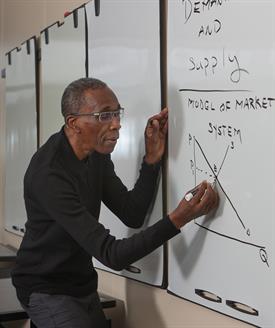To help celebrate Black History Month, we are sharing essays generously provided by a Schoolcraft College faculty member, an SC alumni and an SC student. Each is featured in the February issue of BLAC Magazine.
This week’s author, Cedric Howie, has been a full-time member of the faculty in Economics at Schoolcraft College for 29 years. Prior to coming to Schoolcraft, Professor Howie taught at colleges and universities in South Carolina, Massachusetts, Nebraska and Japan. His area of concentration is in microeconomics.
 My name is Cedric Howie. On most days, in my professional life, I have a unique privilege that a small percentage of people in the world have. I am a professor of economics at Schoolcraft College in Livonia, Michigan. With the support of my parents and family, I have been soundly educated and trained. Before Schoolcraft, I had five years of experiences as a full-time faculty member in higher education. I am writing an essay about an event in my life and how it changed me. I am writing about an experience I had when I was younger to show what I learned and to tell how this event was important to me.
My name is Cedric Howie. On most days, in my professional life, I have a unique privilege that a small percentage of people in the world have. I am a professor of economics at Schoolcraft College in Livonia, Michigan. With the support of my parents and family, I have been soundly educated and trained. Before Schoolcraft, I had five years of experiences as a full-time faculty member in higher education. I am writing an essay about an event in my life and how it changed me. I am writing about an experience I had when I was younger to show what I learned and to tell how this event was important to me.
While the nation around me is experiencing anguish from racially charged incidents, there is often an insulation that comes with teaching in higher education. One fall day in 1991 I was reminded how quickly a sense of power can shift. It was my first semester teaching at Schoolcraft College. At that time, the college had four full-time Afro-American professors. We were in different disciplines: Communications, Computer Science, Economics, and English.
On that day, I began my lecture as usual. I was walking back and forth across the room engaging the class in dialogue about graphs drawn on the board. I could see the class attention was focused at the door. I was told that a mystery lady keeps peeking through the window in the door.
Suddenly, without warning, the door opened and in came the dean of the social science division along with the mystery lady. I was told that the student had come to the dean’s office three times and reported no economics class in session. She did see a Black guy in front on the class entertaining the students.
The dean calmy told her I was the professor. Her eyes looked at me. I could see her heart pounding. The sweating on her skin. She took a seat as the dean exited the class. Just like that, I went from being “Black guy in front of the class entertaining the students” to a worthy professor. The authority was shifted in my favor. I went on having a very engaging lecture.
That event demonstrated that racial stereotypes are constructed beliefs that all members of the same race share given characteristics. These attributed characteristics are usually negative. The stereotyping of African-Americans as theatrical is not uncommon. This method of representing African-Americans as “shuffling, dancing and wisecracking” evolved over time.
It is also important to explore how stereotypes are formed and dispelled in order to intervene in the problem. Educating people about damaging, inaccurate stereotypes is recommended. Small focus groups involving individuals of different races could be organized through schools, universities or churches. Discussion of racial stereotypes and attitudes in a safe format would allow people to explore and possibly discard stereotypes.
Even though it has been many years, this event still stays in my mind. I remember that day a lot, and I am thankful that my parents and growing up in North Carolina prepared me for that experience.